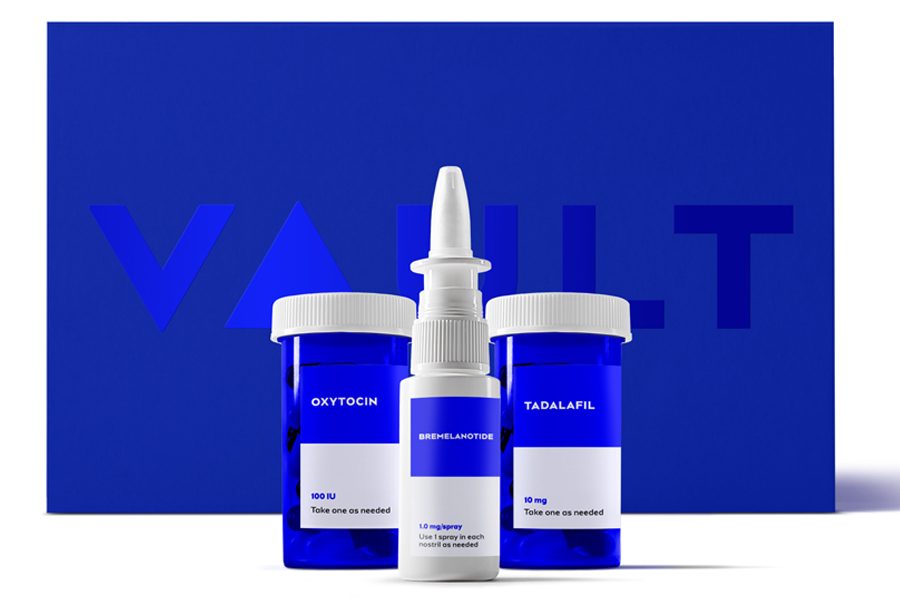
Published:
Readtime: 8 min
Every product is carefully selected by our editors and experts. If you buy from a link, we may earn a commission. Learn more. For more information on how we test products, click here.
Initially coined as a psychoanalytic term, “libido” is a fancy word to describe your sex drive. As you age, it tends to weaken with time and for any number of reasons. While genetic factors can play a role, so too can lifestyle choices, underlying medical conditions, and even anxiety levels. Meanwhile, you’re potentially missing out on one of life’s most pleasurable and healthiest activities: sex. For this reason alone, you should learn about the exact causes of low libido in men.
First and foremost: you’re not the only one. Recent epidemiological studies have shown that low libido and conditions like erectile dysfunction (ED) affect a massive number of adult males. And we’re not just talking men over 50. In fact, one study found that as many as 25 per cent of men under 40 have experienced the symptoms of ED.
Whereas millions of men suffer from a weakened sex drive, only a fraction of those men do anything about it. Should you take a proactive approach, you’ll uncover a host of peripheral benefits. By looking for the root causes of low libido, you’re vicariously examining your inner body and lifestyle choices. As a direct result, you can make the necessary changes to improve both your sex life and your overall way of living.
Before we dive into the causes of low libido, allow us to stress the importance of sexual activity. While fun and pleasurable, an active sex life also supports the body’s production of endorphins and antibodies, both of which are vital to your ongoing health. Call it the best news of the day, but sex is actually good for you when practiced in moderation and with someone you trust.
Last but not least, some of you might be struggling with low libido and already know why. In that scenario, check out wellness brand Vault Health and their effective Libido Kit. Consisting of three key ingredients—bremelanotide, tadalafil, and oxytocin—the kit is formulated to quickly boost libido, improve arousal, strengthen erections, and bolster romantic connections, amongst other things. You can qualify by visiting Vault and consulting with a medical professional through a virtual telehealth portal. The treatment plan is shipped to your door and support is ongoing.
We’ll circle back to Vault’s Libido Kit at the end of this article. In the meantime, let’s explore the potential causes of low libido in men. Here are some of the most common.
1. Low Testosterone Levels
As the foremost male sex hormone, testosterone kicks into gear during puberty and tends to peak in production throughout your teens and twenties. In a number of men, T levels start to decrease after the age of 30, gradually taking libido along with them.
While dropping T levels are a fact of ageing, don’t take that to mean you can’t slow down or even reverse the process. Everything from sleep to diet to exercise can have a direct effect on testosterone and hormone production, in general.
Then we have treatments like testosterone replacement therapy, which are more popular now than ever before. Should you take this route, be sure to stick with a trusted provider such as Vault Health.
2. Psychological Factors
Try not to stress out when we tell you this, but stress can lead to low libido in men. So too can other mental ailments such as general anxiety and depression. That’s not to mention low self-esteem or a poor body image, which can inhibit social and sexual behaviour alike.
As if all that wasn’t burdensome enough, various SSRIs—i.e. a class of medications used to treat things like depression or anxiety—can likewise lead to ED, weaker orgasms, and low libido.

3. Poor Lifestyle Choices
Vices are easy to come by and just as easy to adopt. Meanwhile, drinking alcohol, smoking, or taking drugs can lower libido, as can an unhealthy diet or a general lack of fitness. And while you can file this one under “common sense,” that doesn’t make it any less important.
Are we saying you need to pour out all your booze or stop eating potato chips? Not necessarily. Just like with sexual activity, excessive behaviour yields excessive outcomes. Moderation is key.
4. Lack of Romantic Interest in Your Partner
Anyone who’s been in a long-term relationship knows that the early years are often the most passionate…at least in the physical sense. Jump ahead a decade and you and your partner might start to lose the sexual and emotional bonds that once held you both together. Naturally, this could have a negative effect on libido.
To remedy this dilemma, you have your options. For instance, you can take proactive measures to increase the levels of spontaneity and excitement in your marriage. You might also consider visiting a professional counsellor, who can help steer you in the right directions. Or you can seek out a proper treatment plan like Vault’s Libido Kit or Sex Kit, both of which can boost feelings of romance.
5. Underlying Medical Conditions
Not only will certain medical ailments deliver a constant distraction, but they can have a direct effect on libido. Cancer is an obvious inhibitor, but far from the only one. Here are some other medical conditions that can cause low libido in men:
- type 2 diabetes
- high blood pressure
- high cholesterol
- chronic organ failure
- chronic pain
- obesity
Even restless legs syndrome (RLS)—i.e. the uncontrollable urge to move your legs—has been associated with ED and other signs of low libido.
6. Medications
We’ve already mentioned that certain anti-depressants and anti-anxiety medications can lead to conditions such as ED, but that’s merely scratching the surface. Ultimately, there’s no shortage of medications that can lower T levels or weaken sex drives. Here are some examples:
- blood pressure medication (i.e. ACE inhibitors and beta-blockers)
- cancer treatments (chemotherapy, etc)
- corticosteroids
- opioids
- anabolic steroids
- acid reflux medications such as cimetidine
- antifungal medications such as ketoconazole
The main thing is, if you suspect medications are messing with your mojo, be sure to discuss it with your doctor before you simply stop taking it.
7. Having Children
It’s been reported that a number of men experience temporary drops in T levels as soon as the wife gives birth. From a biological perspective, this makes perfect sense as it helps ensure good parenting. Even after those T levels are restored, however, raising a young child can be a full-time obligation and a libido-killing one at that.
8. Ageing
Allow us to close on an obvious note: you get older and your sex drive gets weaker. Meanwhile, it’s not just your sex drive. Everything from your immune system to your metabolism to your innate genetic structure to your cognitive function can gradually break down over time.

Low Libido Treatment Plan
In response to these seeming inevitabilities, more and more men are taking action. This is exactly where Vault Health comes in with their bevy of effective treatment plans. One of those plans is the Libido Kit and it works on men of all ages, boosting libido, stamina, arousal, romantic feelings, erections, and even orgasms.
While Vault’s treatment plans are personalised to suit your needs, the Libido Kit generally employs the following medications: bremelanotide nasal spray, tadalafil tablets, and oxytocin sublingual tablets. Here’s how it works:
- First, the peptide bremelanotide stimulates libido through nerve receptors in the brain.
- Next, the PDE5 inhibitor tadalafil improves blood flow to the penis, thereby generating long and strong erections.
- Finally, the peptide hormone oxytocin boosts the social and emotional sensations that are naturally produced during orgasm.
To qualify for Vault’s Libido Kit, visit their site to consult with a medical professional through an online portal. If you’re approved for a personalised treatment plan, it will be shipped straight to your door in a discreet and convenient fashion. Support is ongoing and one of the company’s clinicians is always within reach. Read up on any potential side effects, use as directed, and expect to see the results right away.
You’ve learned about the causes of low libido. Now it’s time for a solution. Vault Health has you covered.
All content and media on the Man of Many website is created and published online for informational purposes only. It is not intended to be a substitute for professional medical advice and should not be relied on as health or personal advice. Always seek the guidance of your doctor or other qualified health professional with any questions you may have regarding your health or a medical condition.
General FAQ
As men get older, their libidos tend to get weaker. However, poor dietary choices, a lack of exercise, underlying medical conditions, psychological factors, and certain medications can all expedite the process.
The symptoms of low libido can include a general lack of interest in sexual activity, as well as physical conditions such as erectile dysfunction.
There are a number of ways to increase one’s libido, including natural methods such as sleep, a healthy diet, and exercise. Some people take supplements while others undergo treatments such as hormone replacement therapy.





























Comments
We love hearing from you. or to leave a comment.